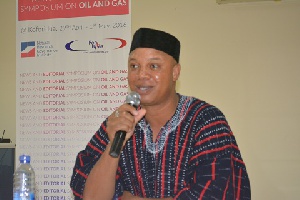Parliament will not pass a law to favour one party over the other, Vice Chairman of the Mines and Energy Committee Adam Mutawakilu has said.
His comment follows a disagreement between Members of Parliament over portions of the Petroleum Exploration Bill.
On Thursday July 14, the house was divided over portions of the bill which seeks to regulate the exploration, development and production of the oil sector.
The bill, which is at the consideration stage of the house, when passed into law will repeal the challenges identified in the PNDC law, which has been in existence for over 30 years.
But during the debate on the bill, aspects of it which grant the Petroleum Minister power to undertake direct negotiations led to concerns from minority Members of Parliament (MP) who argued the powers if not checked could be abused.
The majority MPs however disagreed and argued strongly in favour of the clause’s retention in the bill.
But speaking to Class News, Vice Chairman of the Mines and Energy Committee Adam Mutawakilu said the processes to be adopted during the award of contracts were transparent and not subject to manipulation.
He also said parliament would not pass a law to favour one side of the house over the other.
“….I don’t think there is any bill that we pass in parliament to favour one political party because…we have not had one government since 1992 and as a Member of Parliament, I have never been taught to pass a bill that will favour a government because governments come and go [but] the law still continues to be there and it will be amended. So, whatever I am doing, I must feel comfortable with it when I am at the other side,” he stated.
“But they raised some concerns in respect to Clause 10(3) and then 10 for negating it. Clause 10(3) indicates that a petroleum agreement shall only be entered into after an open, transparent, and competitive public tender process. [Clause] 10(4) said despite sub section (3), the Minister may decide not to enter into a petroleum agreement after the tender process as prescribed,” Mr Mutawakilu added.
Touching on the assertion that the Minister had been given so much power by the bill, the Damongo lawmaker said: “We have oversight responsibility as parliament. If the regulation comes and we pass the regulation and the Minister is going contrary to it, it’s a breach of the law… If there is a need for prosecution, we take it on. We have civil society organisations in this country that are very active and if the Minister knows the regulation that he should do and he refuses to execute it, I know Ghanaians will take it on and the Minister will pay severely for that. So we shouldn’t think that it favours one government. I have never learnt to pass a law to favour my government or another government because governments come and go [but] the law continues to be there and you must be comfortable with it in whichever side you are.”
Business News of Friday, 15 July 2016
Source: classfmonline.com













